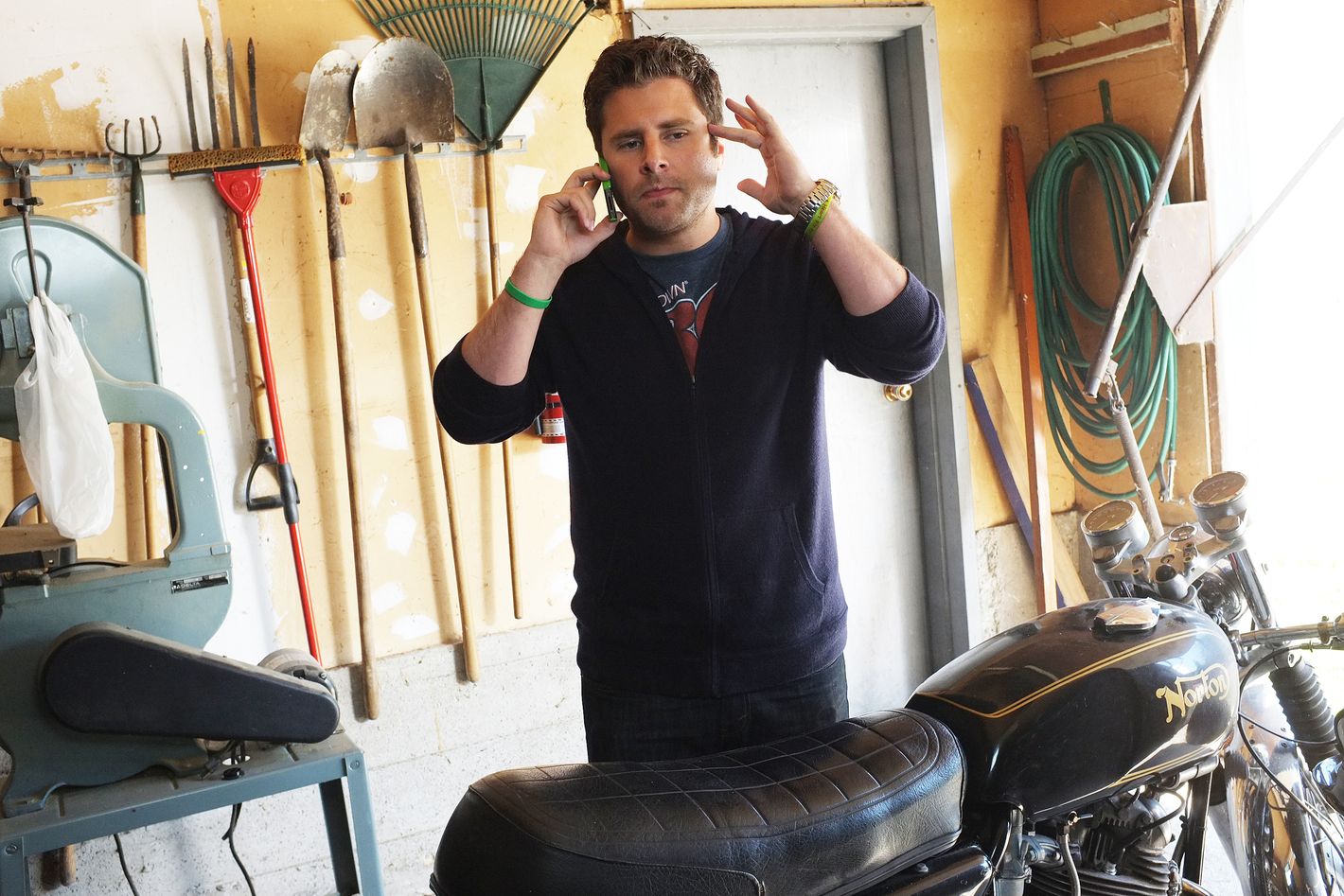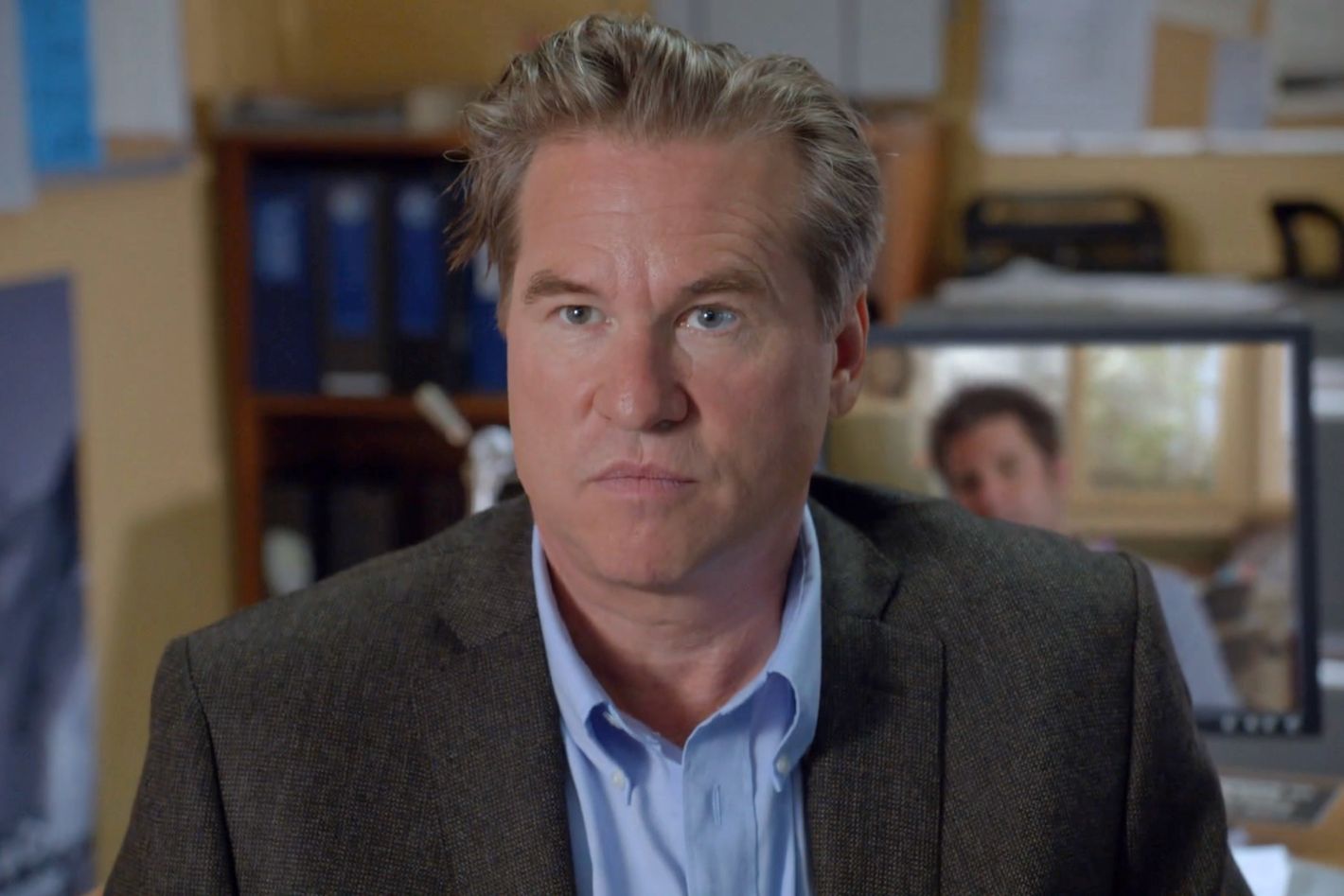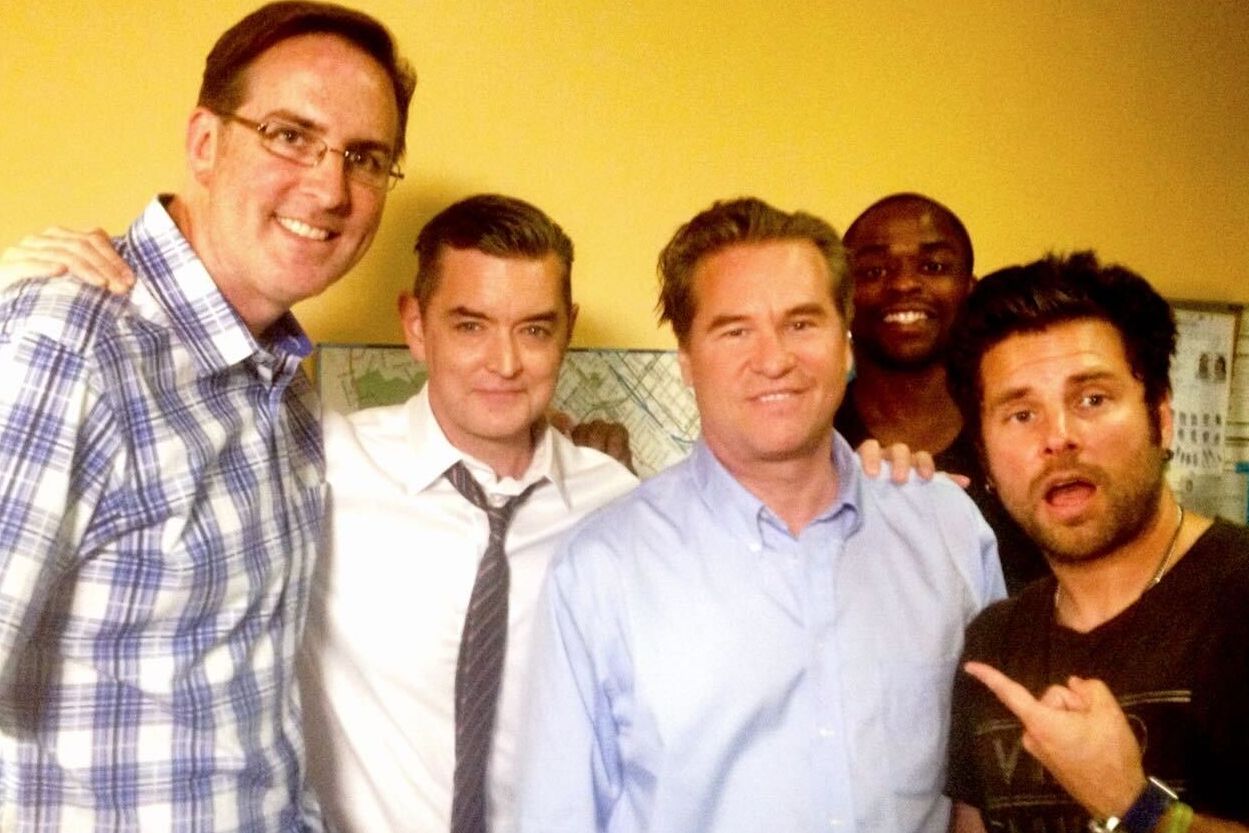

When Psych showrunner Steve Franks was auditioning actors to portray Shawn Spencer, everybody’s favorite psychic detective, he told us how most actors were hitting their lines with too much aggression and snark. James Roday Rodriguez took a different approach: He would embody the comedic spirit of Chris Knight, Val Kilmer’s character from 1985’s Real Genius, giving Shawn a warmth that the others lacked. Rodriguez would go on to embody the role for eight seasons and three sequel films. He and Franks would frequently alter scripts to mention Kilmer and his movies throughout the show’s run; in a major casting coup, Kilmer ended up appearing in Psych’s series finale, “The Break-Up,” portraying the never seen but frequently mentioned Officer Dobson. In a video message near the episode’s end, Shawn laments how he should’ve tried to get to know Dobson better, because — wink, wink — he struck Shawn as a person he “could have worshiped as a child and an adolescent.” Here, Rodriguez unpacks Kilmer’s profound influence on the show and his life. We’ll leave you with this Shawn quote from the third season: “With some people, I can communicate through psychic wavelengths. My father is one of them. Val Kilmer is another.”
Val Kilmer is unequivocally my boyhood idol. I met him on a screen when I was 10 years old in Real Genius. In many ways, he’s been closer to me than the majority of my family. He’s the reason I found myself gravitating toward performance and away from what I thought I was destined to do, which was become a monster-maker à la Rick Baker. As I continued to consume his work and be absolutely fascinated with his ability to change his skin and slip in and out of these characters so seamlessly, I built a vocabulary of how to act in my small and unformed little Texas brain. By the time Psych came along, I had an ability to read a script, absorb a character, and apply this stuff. I read the Psych script and I thought to myself, Holy shit, this is Chris Knight eight years after he left school. I could use this little vessel as a tribute to the character that made me want to be an actor. I don’t even have to be that clever about it. I don’t have to sneak Chris Knightisms in — I’m going to approach it like it is Chris Knight. That’s what I told Steve Franks when we met. As he was writing, he was leaning into a Ferris Bueller dynamic. I said, “I love that too, how about I meet you in the middle?” And that’s how Shawn Spencer was born.
The only way Shawn was ever going to work is if you could find the warmth and Peter Pan in him, so you can forgive him so much up front. If you don’t feel that warmth, I don’t think this show would’ve lasted very long. Shawn would’ve been a grating dude that you wanted to slap the hell out of. You never once wanted to slap Chris Knight. You just wanted him to come back onscreen when he wasn’t in a scene. He was the thing that lifted every element of the movie and elevated it to a cult classic when it could’ve been lost in a sea of ’80s comedies about young people that nobody remembers. I wanted Psych to be the same thing, amid the television landscape, and that’s how I approached it unapologetically.
The spirit of Val is in the DNA of Psych. When you do a show that lasts as long as ours did, there comes a point where you’re reaching for things to keep that level up. When you get into your 60th, 70th, and 80th episode, it’s like, How do we keep making these things good? We have a responsibility. Val was always the north star for me. I did some sniffing before certain lines as a little wink toward Iceman in Top Gun’s locker room. But the most Val aspects of that role were the opportunities to play characters within a character. When we got to dress up, do accents, and be silly, I felt like I was the Saint. When I think of all of Val’s movies, The Saint is nowhere near the top of his “best films,” but I imagine it was way up there for him in terms of how much fun he had. He had to play a dozen characters, wear prosthetics, and be silly. I didn’t want Psych to just be a silly show. I wanted it to be more than that. I was constantly challenging myself to be as good as I could possibly be. I knew there was a decent chance when it ended, I would never get to play a role like that ever again, or anything close to it. Maybe this is my entire career in one series, as opposed to Val getting to have the better part of 30 years.


We didn’t try to get Val before our series finale. I never felt like it was an achievable goal. For the first few seasons, we were obsessed with getting David Bowie, and when it became clear that was never going to happen, we stopped thinking of bigger names. There was a part of me that was like, I’ve heard the stories. I’ve read the articles. He’s a complicated, challenging, and bad-behaving actor. I didn’t want Val to come onto this set and destroy my childhood. When we were nearing the end, it happened to be when Val was touring his one-man Mark Twain show. My dear friend Jimmi Simpson and I went to see it when Psych was on a filming hiatus. I met Val afterwards. I didn’t have a game plan, but I thought, If this is going well and if he’s looking me in the eyes, take a shot. That’s exactly how it went. He couldn’t have been nicer. I told him, “We’ve had this important but unseen role for eight seasons; it would be such a gift if it’s revealed it’s been you the whole time. And by the way, nobody has been referenced on Psych more than you. And I love you.” Dulé Hill and I cut together a sizzle reel of every Val reference in eight years. We sent it off. He was flattered and a bit moved. He’s a strange guy, but he’s deep and loved the impact art could have. So it was a yes.
We weren’t going to make him fly to Canada to say two lines. We wrapped production on Psych, everybody felt all those feelings, and we came back to Los Angeles. The five of us and a skeleton crew got together one last time to shoot this little scene with Val. That was the last thing we ever shot for the series, which was poetic. Having no concept of our show existing up until that moment, Val could clearly see how much it meant to us, and that’s why it meant something to him. He never went back to his trailer. He knew we all wanted to talk to him, hear a few stories, and be in his glow. There was this fleeting moment where I was like, Am I going to exchange numbers with Val Kilmer and attempt to become a casual acquaintance in his life? I didn’t do it. I don’t want Val to be a guy I get a text from on my birthday. I want Val to be the icon that helped form me into the performer I am. I wanted to keep him on a pedestal.
Related

Latest News
For Sale! 2016 Sea Ray 350 Sundancer – $180,000
Reel Deal Yacht is pleased to feature a meticulously maintained 2016 Sea...
Paris Saint-Germain staves off Villa comeback to reach Champions League semifinals
Their players were rattled. Their goalkeeper was pulling off save after save....
What is Jackie Robinson Day around Major League Baseball and why is it always on April 15?
Jackie Robinson’s legacy is being celebrated around the major leagues on Tuesday,...
Sharks captain Logan Couture ends his hockey career because of debilitating injury
Logan Couture began dreaming of playing in the NHL as a 3-year-old...
Guirassy scores a hat trick in vain for Dortmund as Barcelona advances to Champions League semis
Serhou Guirassy and Borussia Dortmund did what no else has been able...














Leave a comment